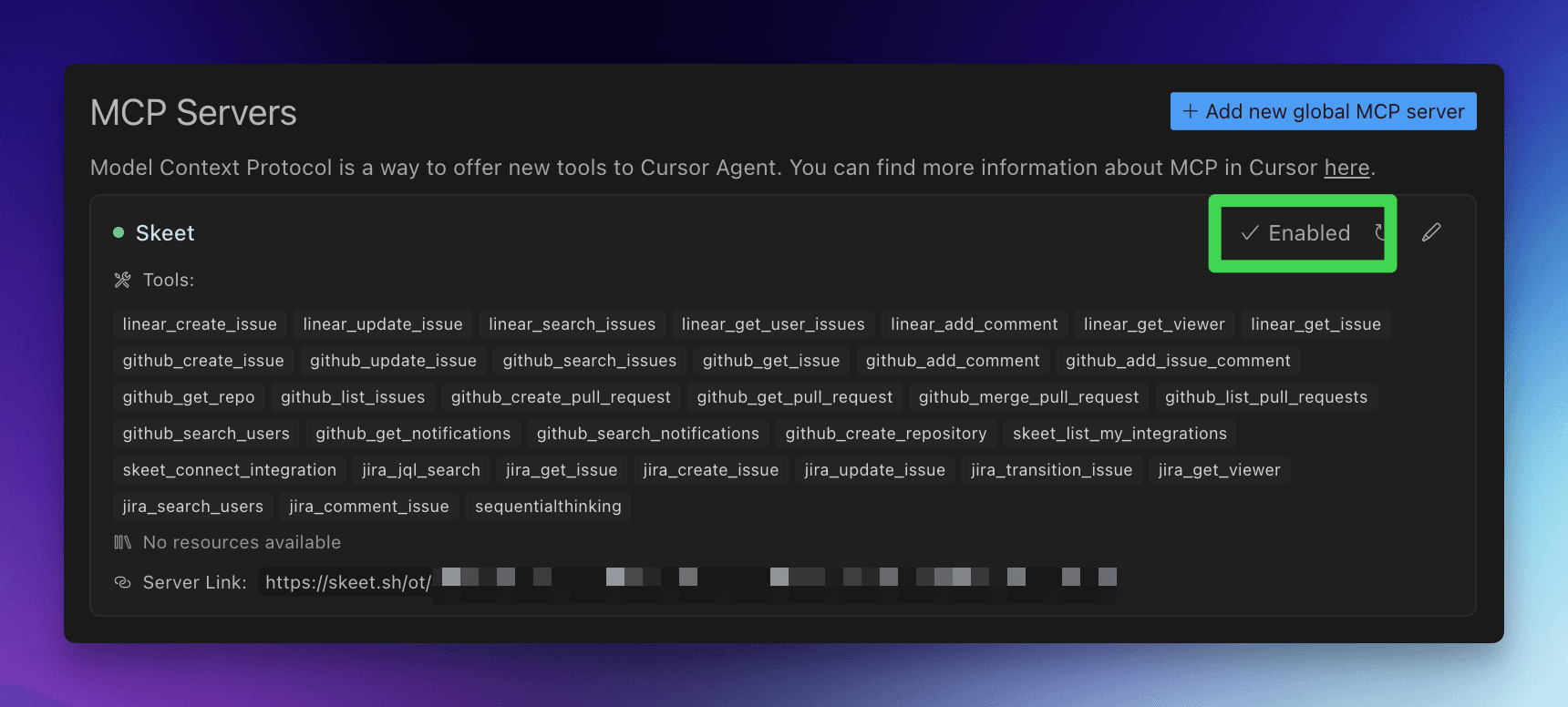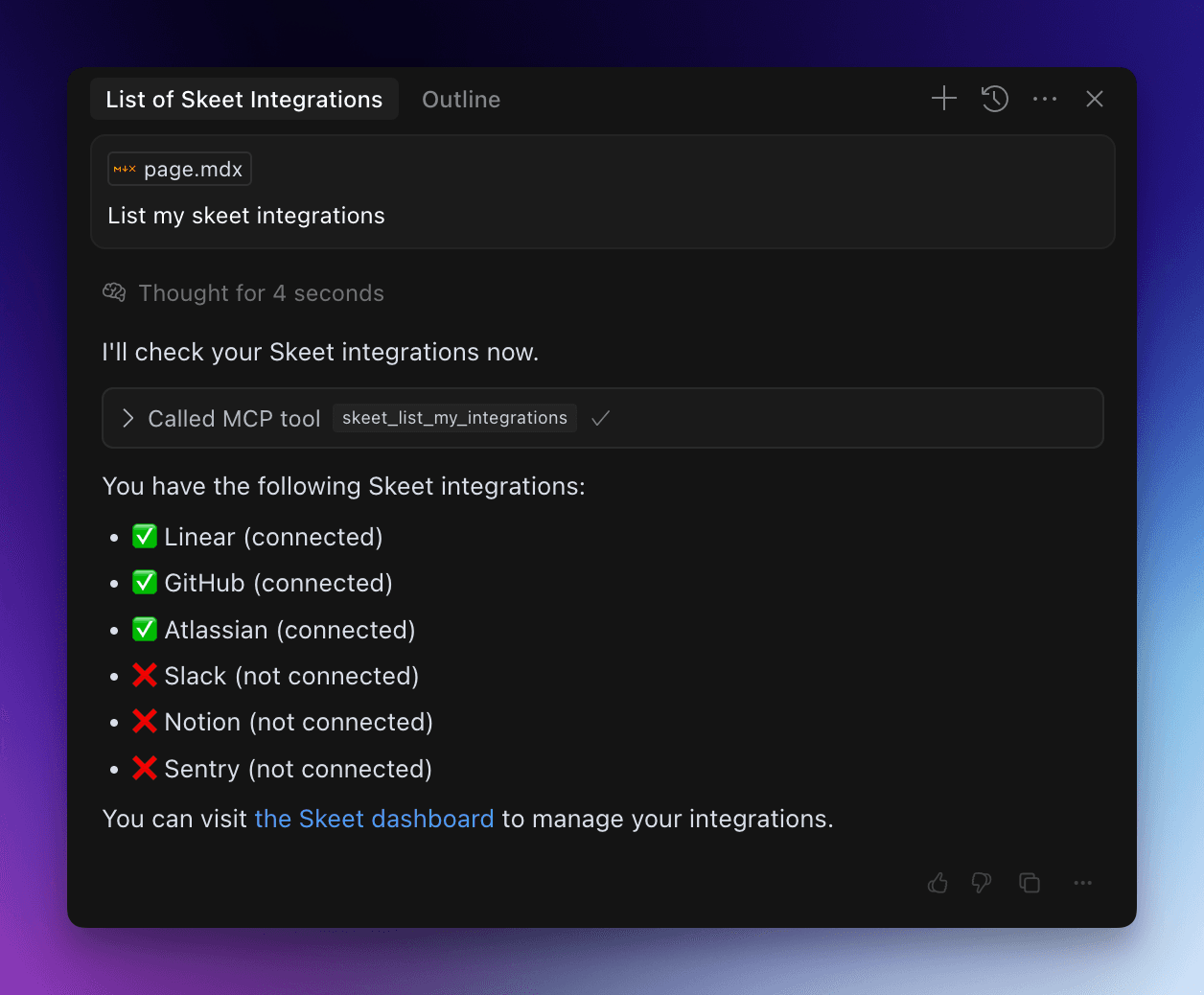How to connect MCP to Cursor
Skeet integrates seamlessly with Cursor via Model Context Protocol (MCP), enabling your AI coding assistant to connect with your favorite development tools and services.
What is Model Context Protocol?
Model Context Protocol (MCP) is the technology that connects AI applications like Cursor to external tools and services through Skeet. MCP allows:
- Secure connections between your AI tools and external services
- Context sharing across multiple applications
- Tool augmentation giving AI models the ability to perform actions in the real world
- Enhanced capabilities beyond what's built into the AI application itself
With MCP, your Cursor AI assistant can interact with services like GitHub, Linear, Jira, and more, making it much more powerful and useful for your development workflow.
Setting Up Cursor with Skeet
To use Skeet with Cursor, you'll need to:
- Get your Skeet MCP key from the Skeet dashboard
- Configure Cursor to use the Skeet MCP server
- Connect integrations in your Skeet dashboard
Your Skeet MCP key is sensitive and grants access to your connected integrations. Never share it and rotate it if you suspect it has been compromised.
Global Configuration
For tools that you want to use across all projects, create a ~/.cursor/mcp.json file in your home directory. This makes MCP servers available in all your Cursor workspaces.
- Navigate to your home directory
- Create a
.cursordirectory if it doesn't already exist - Create an
mcp.jsonfile inside this directory with the following content:
{
"mcpServers": {
"skeetbuild": {
"url": "https://skeet.sh/ot/YOUR_SKEET_MCP_KEY"
}
}
}Treat your MCP configuration like a password. Never share it or commit it to version control.
Replace <YOUR_SKEET_MCP_KEY> with your actual Skeet MCP key from the dashboard.
- Save the file and ensure the server is set to Enabled in the settings UI

Project Configuration
For tools specific to a project, create a .cursor/mcp.json file in your project directory. This allows you to define MCP servers that are only available within that specific project.
- Navigate to your project directory
- Create a
.cursordirectory if it doesn't already exist - Create an
mcp.jsonfile inside this directory with the following content:
{
"mcpServers": {
"skeetbuild": {
"url": "https://skeet.sh/ot/YOUR_SKEET_MCP_KEY"
}
}
}Treat your MCP configuration like a password. Never share it or commit it to version control.
With this approach, the MCP configuration only applies when you're working within that project directory.
Verifying Your Connection
After setting up your MCP connection, you should verify it's working correctly:
- Open a project in Cursor
- Ask your AI assistant to list your Skeet integrations:
List my Skeet integrations
If the connection is successful, you'll see a response showing available integrations and their connection status.

Best Practices
Here are some best practices for using Skeet with Cursor:
- Connect multiple integrations to maximize the utility of your AI assistant
- Use clear, specific prompts when asking the AI to interact with external services
- Verify actions before letting the AI execute potentially destructive operations
- Maintain security by rotating your MCP key periodically
- Keep Cursor updated to ensure compatibility with the latest MCP features
Example Use Cases
GitHub Integration
Create a GitHub issue in owner/repo with title "Fix navigation bug in header" and body "The dropdown menu in the navigation header doesn't close when clicking outside."
Linear Integration
Create a Linear issue with title "Implement user profile page" and priority high
Jira Integration
Create a Jira issue in project KEY with title "Refactor authentication service" and type Task
Integrations
Skeet supports a growing ecosystem of integrations that can be used with Cursor:
GitHub
Manage repositories, issues, and pull requests
Linear
Create and manage tickets in your project management workflow
Slack
Send and read messages from your Slack workspace
Notion
Create and edit content in your Notion workspace
MySQL
Query and manipulate data in MySQL databases
View all integrations
Explore the complete list of available integrations
Connect integrations in your Skeet dashboard to enable them for use with Cursor.
Troubleshooting
If you encounter issues with your Skeet Cursor integration:
Common Problems
- AI doesn't recognize MCP commands: Verify your MCP server is enabled in Cursor settings
- Authentication errors: Check that your MCP key is correct and not expired
- Integration not working: Ensure you've authorized the integration in the Skeet dashboard
Getting Help
If you continue to experience issues:
- Review the MCP documentation for more information
- Review the Cursor documentation for MCP-related guidance
- Contact Skeet Support with details about your problem